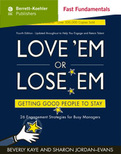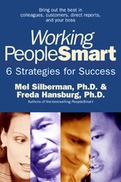2004
- Offers six easy-to-apply strategies for becoming people-savvy at work, with over 50 examples of the strategies in action
- No complex personality typologies or classification systems to learn-these are universal techniques that work on everyone, and in any situation
- From the authors of PeopleSmart: Developing Your Interpersonal Intelligence
Making the Grass Greener on Your Side is the story of how Ken Melrose adopted a philosophy of leading by serving and made it work in a real-world-and often challenging-situation. His mission as CEO of The Toro Company has been to build an environment that not only serves the needs of the corporation, but also provides a climate for its constituents-the employees-to grow and develop as human beings. In Making the Grass Greener on Your Side, he shows how cultivating an environment for individual growth creates a win-win situation for the company and the employee.
In the "servant leadership" model, leaders operate from a principle-centered base by working for and serving the rest of the organization. This approach allows employees to grow and contribute in ways that best serve the long-term interests of the company. Melrose tells of both the successes and struggles in applying the model to the Toro environment.
This book follows Toro's history-beginning in 1979, when Toro had reached a peak of unparalleled expansion and development, to the brink of disaster in 1981, and back again. Readers will learn about the company's cut-backs and sacrifices, its self-examination, its decision to embark on the path of servant leadership, and its ultimate return to profitability and customer satisfaction. Melrose recounts his own process of refining his personal commitment to leadership principles and gaining the courage to implement fundamental changes. He tells which culture initiatives and leadership strategies the company applied, which worked, and why.
Making the Grass Greener on Your Side helps readers take stock of where their company is now, and shows how to cultivate the soil and prepare a "seed-bed" that will allow for the deep rooting of value-centered leadership principles. Melrose tells how to develop a culture that will allow for sustained growth, and describes the abundant fruits of the long-term approach that occur all along the journey.
- By the CEO of The Toro Company, a member of the Fortune 500
2018
Creating the Foundation for Entrepreneurship in Developing Countries
Entrepreneurial ventures often fail in the developing world because of the lack of something taken for granted in the developed world: trust. Over centuries the developed world has built up customs and institutions like enforceable contracts, an impartial legal system, credible regulatory bodies, even unofficial but respected sources of information like Yelp or Consumer Reports that have created a high level of what scholar and entrepreneur Tarun Khanna calls “ambient trust.” If a product is FDA-approved we feel confident it's safe. If someone makes an untrue claim or breaks an agreement we can sue. Police don't demand bribes to do their jobs. Certainly there are exceptions, but when brought to light they provoke a scandal, not a shrug.
This is not the case in the developing world. But rather than become casualties of mistrust, Khanna shows that smart entrepreneurs adopt the mindset that, like it or not, it's up to them to weave their own independent web of trust—with their employees, their partners, their clients, their customers and with society as a whole. This can certainly be challenging, and requires innovative approaches in places where the level of societal mistrust is so high that, as in one example Khanna provides, an official certification of quality simply arouses suspicion—and lowers sales! Using vivid examples from Brazil, China, India, Mexico and elsewhere, Khanna shows how entrepreneurs can build on existing customs and practices instead of trying to push against them. He highlights the role new technologies can play (but cautions that these are not panaceas), and explains how entrepreneurs can find dependable partners in national and local governments to create impact at scale.
As far back as the 18th century Adam Smith recognized trust as what Khanna calls “the hidden engine of economic progress.” “Frankness and openness conciliate confidence,” Smith wrote. “We trust the man who seems willing to trust us.” That kind of confidence is critical to entrepreneurial success, but in the developing world entrepreneurs have to establish it through their own efforts. As Khanna puts it, “the entrepreneur must not just create, she must create the conditions to create.”























